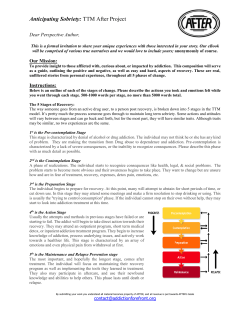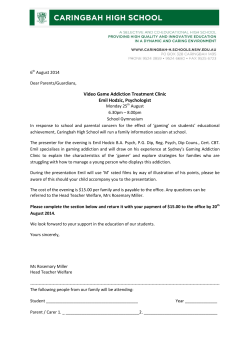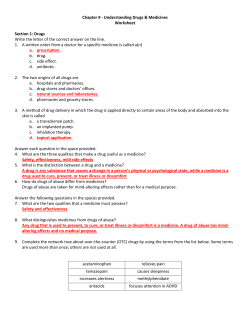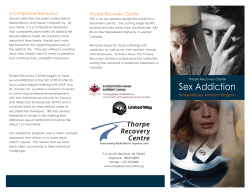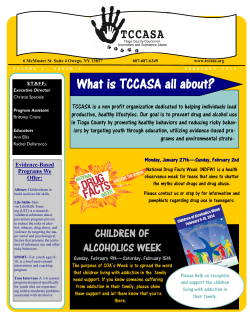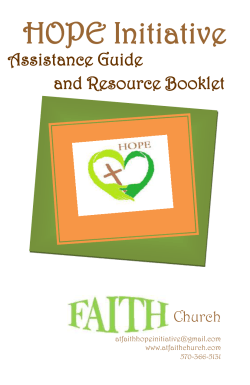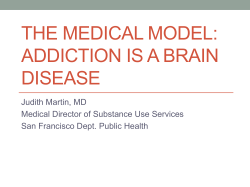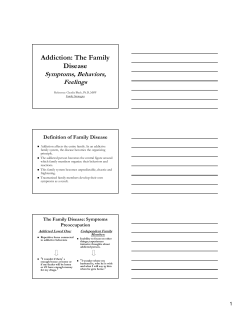
A Guide to Helping Someone Who Might Have a Drug or Alcohol
and Washington Hope, Help & Healing A guide to helping someone who might have a drug or alcohol problem www.drugfree.org 1-800-562-1240 YOU ARE NOT ALONE Are you worried that someone you care about has a drug or alcohol problem? Or do you feel your own use is out of control? You or your loved one can get better, and there are many ways to get help. This booklet will provide important facts about addiction and ways to get started on a path to recovery. Inside, you’ll find information on: Signs to look for Where to start How to intervene Finding hope and help Act now. First steps are often the most difficult, but when it comes to addiction, you cannot wait. Addiction is a disease—a serious health problem like heart disease, cancer or diabetes—that can happen to anyone who uses alcohol or other drugs. If left untreated, it can progress and may even be fatal. Don’t wait until something really bad happens. Get help now. Addiction can affect anyone. It afflicts 22 million Americans: men and women, teens and adults, poor, middle class and affluent, in rural towns, suburbs and cities. In Washington alone, one out of 10 adults needs treatment for an alcohol or drug use disorder. Because it has a strong genetic component, addiction tends to run in families. However, families just like yours have successfully intervened when loved ones are in trouble with drugs or alcohol and helped them get well. You are not alone. You may feel that no one can help you—that you and those you care about have to suffer alone. But there are people who have been there and many resources to help you understand and cope with drug and alcohol addiction. Families can thrive with hope, help and healing. Alcohol and other drug addiction can change family relationships in profound ways. You and members of your family may feel guilty, frustrated, confused, angry or powerless. Attending Al-Anon or Alateen meetings, which provide support to families and friends of people with addictions, may be helpful. SIGNS TO LOOK FOR PHYSICAL SIGNS TO LOOK FOR Bloodshot eyes Slurred or agitated speech Sudden or dramatic weight loss Skin abrasions/bruises Neglected appearance/poor hygiene Frequently sick Accidents or injuries Unusual odors on breath; stains and odors on clothing BEHAVIORAL SIGNS TO LOOK FOR Hyperactivity or unusual aggression Secretive behavior, including lying and locked doors The most obvious sign of addiction is using drugs or alcohol uncontrollably, despite the fact that use is causing problems. Addicted people’s behavior can change dramatically, and they can act out of character, which is confusing and upsetting to friends and family members. If you’ve noticed any of the warning signs listed in the boxes to the right, investigate as soon as possible. “ My life today is a billion times better than Hidden stashes of alcohol, drugs or drug paraphernalia Missing alcohol or prescription medicine Not fulfilling responsibilities or missing school or work Avoiding eye contact EMOTIONAL SIGNS TO LOOK FOR when I was on drugs, and I think it’s totally due to being part of a 12-step program: being with other people who are alcoholics and addicts, working with them. Realizing addiction is a disease; that there’s nothing to feel guilty about. Sudden shifts or changes in mood and personality — Beth Hart, singer/songwriter No interest in previously enjoyed hobbies or activities ” Emotional instability Depression WHERE TO START Learn the facts. Educating yourself about drug or alcohol addiction is the first step. For more information about addiction and types of treatment, visit www.drugree.org, www.adhl.org or call 1-800-562-1240. Friends and family members can influence and motivate addicted people to get well. However, people sometimes feel powerless to help, because they accept “myths” like the ones below: Your Drug and Alcohol Use. If you’re concerned about your own drug or alcohol use, you don’t have to deal with it alone. Call the 24-Hour Alcohol/ Drug Helpline for free, confidential information: 1-800-562-1240. Consider also talking to your doctor, therapist, teacher or a family member who can lend support. Or attend a meeting of Alcoholics Anonymous (AA), Narcotics Anonymous (NA), Smart Recovery or another anonymous self-help group devoted to helping members recover and lead healthy lives. Myth: “She can stop using drugs if she really wants to.” Reality: A person can control his or her alcohol or drug use at first. But long-term use actually changes some people’s brain and body functions so they crave alcohol or the drug, and feel sick without it. They find it difficult to stop on their own using willpower. Myth: “People don’t go for help until they hit ‘rock bottom’.” Reality: Your loved one does not have to lose everything before taking the first step. Pressure from family members and employers, the legal system, healthcare professionals and clergy can motivate an addicted person to seek treatment earlier. And that may save his or her life. Myth: “Treatment won’t work for him.” Reality: No matter how severe the addiction, treatment can work, especially when a person is committed to working on recovery and has a strong support system. In fact, the success rate for such treatment is similar to other chronic illnesses like diabetes, asthma and hypertension. DEFINITIONS Addiction – uncontrollable, compulsive alcohol or drug use despite the fact that use is causing problems. Can include physical cravings when not using. There can be a genetic predisposition. Intervention – a meeting of family and friends led by a mental health professional demanding that an addicted person get help. Can also be a personal conversation to express concern and urge change. Detox or detoxification – cleansing the body of alcohol or other drugs under a doctor’s care. A first step in the treatment process. Treatment – individual and group counseling for an addicted person and his family to change a pattern of behavior that has led to problems with alcohol and/or other drugs. May also include using medication to relieve physical symptoms and cravings. Recovery – an on going process of major life change in which an addicted person stops drinking and using other drugs and works toward restoring a functional life. For more information, visit www.drugfree.org or call 1-800-562-1240 HOW TO INTERVENE Check it out. If you’re not sure if someone has a drug or alcohol problem, use our confidential online quizzes to learn whether professional help is needed. Go to www.drugfree.org, click on Get Help for Drug Problems, then Is it a Problem? Before you intervene. Much is now known about how to intervene effectively. The goal of a group intervention is for an addicted person to get a professional evaluation and begin treatment. You may want to consult with a professional interventionist before intervening, because the intervention may be more effective when led by a health professional. The family’s role. To be effective, an intervention needs to include an addicted person’s loved ones. Often, they reach “rock bottom” before the person who needs help does, and can team up to push him or her to seek professional help. Family members and friends need to educate themselves about addiction and change their own behavior if their loved one’s recovery is to succeed. Locate resources—near and far. People get well through a variety—and sometimes a combination—of approaches, so it’s essential to find out what help is available before you intervene. Call 1-800-562-1240 to identify appropriate alcohol or drug treatment programs. Treatment has many forms, but effective treatment will address physical, psychological, emotional and social problems and will involve family members. Make an appointment at a treatment center and attend meetings of local self-help groups to better understand what your loved one is going through. Recovery is much more effective with support from family members and friends. Intervene as soon as possible. Whether you are a friend, family member, concerned employer or co-worker, you can encourage an addicted person to get the help he or she needs. Interventions do not have to be angry or dramatic, and effective ones can be loving, but firm, expressions of concern. But do intervene, either immediately or as soon as possible. It’s never too late, although the earlier you act, the greater the likelihood of successful treatment and recovery. WHEN YOU INTERVENE Talk when the person has not been using drugs or alcohol. Stay calm. Express your comments with non judgmental caring and concern. Avoid labeling the person an “alcoholic” or “addict.” List specific incidents resulting from the person’s drug or alcohol problem (for example, “You were recently arrested for DWI.”). Stick to what you know firsthand, not hearsay. Talk in “I” statements, explaining how the person’s behavior has affected you (“I felt scared when you came home high last night…”). Be prepared for denial, resentment and rejection. Be supportive and hopeful about change. Recovery is much more effective when family members are involved and have realistic, yet optimistic, expectations about the process. “ Ask yourself, ‘Why don’t I be the one in my family to break the chain?’ Seek help. There is always hope, and there is life after addiction. For more information, visit www.drugfree.org or call 1-800-562-1240 — Margaret E. Pierre, 78, sober for 20 years ” FINDING HOPE AND HELP NEED HELP? GET HELP! The Partnership for a Drug-Free America and Washington www.drugfree.org People with drug and alcohol problems can get well; they can regain their physical health and well-being and improve their relationships with others. This happens when the person has stopped using drugs or alcohol and is “in recovery.” Recovery is not instantaneous. It’s a process that requires work to maintain, but it can lead to a profound life transformation with enormous personal growth. Some people experience it as a spiritual awakening, but recovery is also possible through therapy and non-spiritual self-help groups. If you are worried that you or someone you care about may have a drug or alcohol problem, it’s important to intervene now. You can connect and share experiences with people who overcame their own alcohol or drug problems and those who intervened. Learn about addiction, types of treatment, and where to go for help. Take online quizzes to find out if you or someone you know needs professional help. Learn what family members can do to support a loved one’s recovery. Get help for your problem and support to stay off drugs and alcohol. Read real people’s stories of how they got well. Find links to the best resources on the Web. State funding for treatment is available now. To find out who qualifies, and to find a treatment agency near you, call 1-800-562-1240. To read about people’s recoveries, go to www.drugfree.org, click on “Get Help for Drug Problems,” and then “Stories.” Treatment Works!
© Copyright 2025
